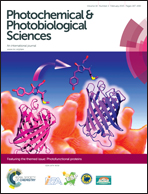Photophysics and photochemistry of cis- and trans-hydroquinone, catechol and their ammonia clusters: a theoretical study†
Abstract
Excited state hydrogen transfer in hydroquinone– and catechol–ammonia clusters has been extensively investigated by high level ab initio methods. The potential energy profiles of the title systems at different electronic states have been determined at the MP2/CC2 levels of theory. It has been predicted that double hydrogen transfer (DHT) takes place as the main consequence of photoexcited tetra-ammoniated systems. Consequently, the DHT processes lead the excited systems to the 1πσ*–S0 conical intersections, which is responsible for the ultrafast non-radiative relaxation of UV-excited clusters to their ground states. Moreover, according to our calculated results, the single hydrogen detachment or hydrogen transfer process essentially governs the relaxation dynamics of smaller sized clustered systems (mono- and di-ammoniated).



 Please wait while we load your content...
Please wait while we load your content...